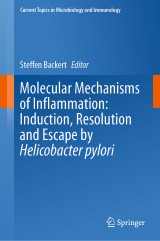Details

Molecular Mechanisms of Inflammation: Induction, Resolution and Escape by Helicobacter pylori
Current Topics in Microbiology and Immunology, Band 421
|
171,19 € |
|
| Verlag: | Springer |
| Format: | |
| Veröffentl.: | 23.05.2019 |
| ISBN/EAN: | 9783030151386 |
| Sprache: | englisch |
Dieses eBook enthält ein Wasserzeichen.
Beschreibungen
<p></p><p>This book focuses on immune reactions and interactions of humans with <i>Helicobacter pylori </i>- a human pathogen connected to gastritis, peptic ulcers and even gastric cancer. With nearly half of the world’s population colonized, it has been characterized as one of the most successful pathogens for more than 100,000 years of co-evolution with its host. The respective chapters discuss not only how <i>H. pylori</i> infection is considered a paradigm for persistent bacterial infection and chronic inflammation, but also how the infection might be connected to host protection against gastro-esophageal diseases, asthma, and other allergic disease manifestations. Readers will gain essential insights into the roles of specific factors in the immune response and learn about the impact of genetic polymorphisms on the risk of gastric carcinogenesis. In addition, the book discusses the strategies used by this bacterium, which allow it to colonize specific sites in the stomach, interact with the microbiome, evade immune surveillance and undermine the resolution of inflammation during persistent infection. </p><p>This volume presents a concise summary of recent advances in the areas of induction, resolution and escape of inflammation, innate and adaptive immunity, gastric disease development, as well as treatment and vaccination against <i>H. pylori</i>. Accordingly, it offers a valuable asset for scientists and clinicians alike.</p>
<p> </p><p></p>
<p> </p><p></p>
<p></p><p>Inflammation, immunity and vaccine development for the gastric pathogen Helicobacter pylori.- Impact of Helicobacter pylori Virulence Factors on the Host immune Response and Gastric Pathology.- Genetic polymorphisms in inflammatory and other regulators in gastric cancer: risks and clinical consequences.- MALT lymphoma as a model of chronic inflammation-induced gastric tumor development.- Crosstalk between DNA damage and inflammation in the multiple steps of gastric carcinogenesis.- Importance of toll-like receptors in pro-inflammatory and anti-inflammatory responses by Helicobacter pylori infection.- Role of NOD1 and ALPK1/TIFA signalling in innate immunity against Helicobacter pylori infection.- Carbohydrate-dependent and antimicrobial peptide defense mechanisms against Helicobacter pylori infections.- The sweeping role of cholesterol depletion in the persistence of Helicobacter pylori infections.- Helicobacter pylori deregulates T and B cell signaling to trigger immune evasion.- Mechanisms of inflammasome signaling, microRNA induction and resolution of inflammation by Helicobacter pylori.- Impact of the gastrointestinal microbiome in health and disease: co-evolution with the host immune system.- Resolution of gastric cancer-promoting inflammation: a novel strategy for anti-cancer therapy.</p><p></p>
<b>Prof. Dr. rer. nat. Steffen Backert<br></b>Chair of Microbiology<br>Friedrich Alexander University Erlangen/Nuremberg<br>Department of Biology<br>Division of Microbiology<br>Staudtstr. 5<br>D-91058 Erlangen<br>Germany<br>Tel. ++49 9131 8528081<br>Fax ++49 9131 8528082
<p>This book focuses on immune reactions and interactions of humans with <i>Helicobacter pylori </i>- a human pathogen connected to gastritis, peptic ulcers and even gastric cancer. With nearly half of the world’s population colonized, it has been characterized as one of the most successful pathogens for more than 100,000 years of co-evolution with its host. The respective chapters discuss not only how <i>H. pylori</i> infection is considered a paradigm for persistent bacterial infection and chronic inflammation, but also how the infection might be connected to host protection against gastro-esophageal diseases, asthma, and other allergic disease manifestations. Readers will gain essential insights into the roles of specific factors in the immune response and learn about the impact of genetic polymorphisms on the risk of gastric carcinogenesis. In addition, the book discusses the strategies used by this bacterium, which allow it to colonize specific sites in the stomach, interact withthe microbiome, evade immune surveillance and undermine the resolution of inflammation during persistent infection. </p>
<p>This volume presents a concise summary of recent advances in the areas of induction, resolution and escape of inflammation, innate and adaptive immunity, gastric disease development, as well as treatment and vaccination against <i>H. pylori</i>. Accordingly, it offers a valuable asset for scientists and clinicians alike.<br></p><br>
<p>This volume presents a concise summary of recent advances in the areas of induction, resolution and escape of inflammation, innate and adaptive immunity, gastric disease development, as well as treatment and vaccination against <i>H. pylori</i>. Accordingly, it offers a valuable asset for scientists and clinicians alike.<br></p><br>
Broadens the reader’s understanding of host-pathogen interactions regarding Helicobacter pylori Provides new insights into the context of gastric inflammation and carcinogenesis Reviews the impact of H. pylori virulence factors on the host’s immune system

















